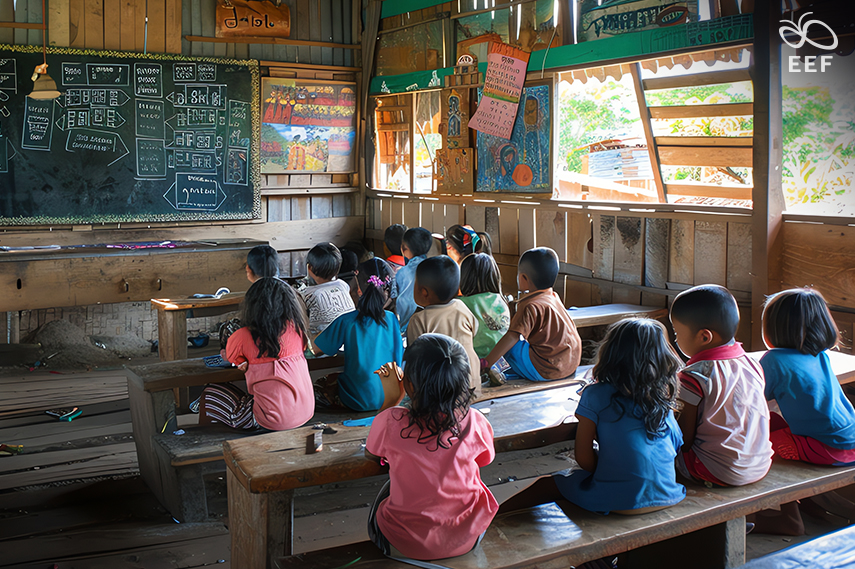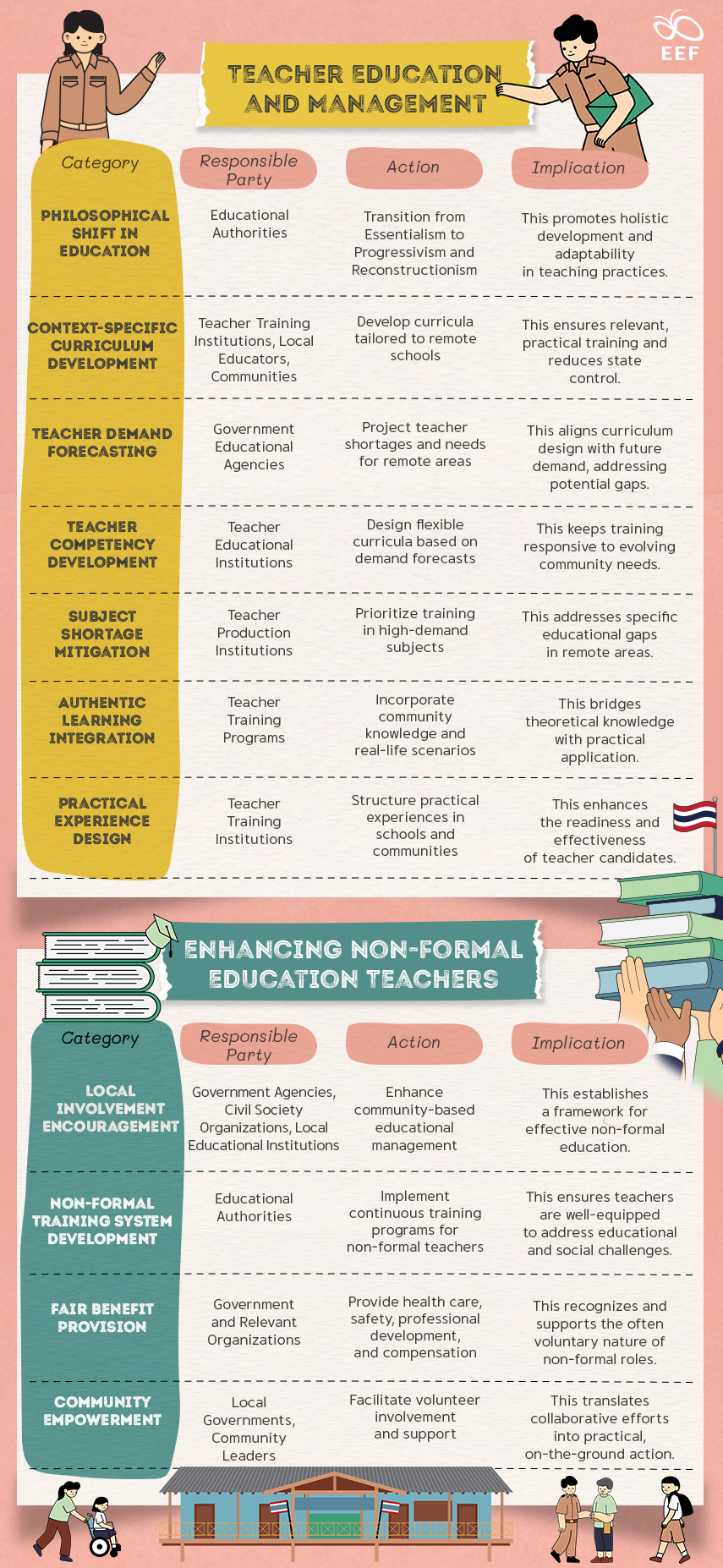
Revamping education in underserved areas requires innovative strategies that connect teacher development with community engagement, cultivating schools that spark curiosity and encourage growth. By utilizing local resources and fostering collaboration, these initiatives aim to create adaptable curricula and supportive environments, empowering educators to address the diverse needs of their communities. Consequently, not only do these revitalized educational systems improve student outcomes, but they also promote a culture of lifelong learning that benefits entire communities. In the following paragraphs, we will delve into two impactful initiatives dedicated to transforming educational landscapes, alongside a summary of policy recommendations proposed by the Equitable Education Fund (EEF) Thailand, which underscore the significance of progressive, holistic approaches in teacher education. In this evolving context, the focus is on developing tailored curricula and anticipating future needs, while integrating practical experiences and strengthening support systems through comprehensive training and community involvement.

The “Homegrown Teacher” initiative, driven by a coalition of six agencies — including the Ministry of Education (MOE), the Ministry of Higher Education, Science, Research, and Innovation (MHESI), the Office of the Basic Education Commission (OBEC), the Office of the Teacher Civil Service and Educational Personnel Commission (OTEPC), the Secretariat Office of the Teachers’ Council of Thailand, and the EEF Thailand — is dedicated to enriching educational opportunities in remote areas through the training of new educators. Focusing on nurturing a cadre of passionate individuals, it aims to enable these students to complete their undergraduate education and return as dedicated teachers in their home communities. Building upon innovative training methods, the initiative aspires to establish model teacher development institutions nationwide, as evidenced by its impressive 99.66% retention rate and nearly 100% pass rate for basic teaching licenses in its first cohort. This success, attributed to its collaborative approach with 18 local teacher networks and volunteer support, is further marked by its transformation of 1,200 to 1,500 remote schools into “destination schools” that elevate educational quality and address local needs. Among these, 694 schools benefited from the Teacher and School Quality Program (TSQP), which emphasizes Q-Info, Networking, Innovation, and student support systems, creating a dynamic and mutually reinforcing system that extends educational excellence beyond local confines and weaves a comprehensive strategy for systemic change.
Systemic Change Driven by Homegrown Teacher Initiative

The transformation in educational management extends beyond rural areas, addressing other critical sectors as well. The shift from “supervisors” to “learning managers” within the criminal justice system for children and youth exemplifies this broader change. This initiative is led by the EEF, in collaboration with the Department of Juvenile Observation and Protection and the Infinite Intelligence Foundation, to overhaul traditional roles. The goal is to convert supervisors into learning managers who inspire greater engagement in education among youth in juvenile training centers and observation facilities, to enhance their academic, vocational, and life skills. This transformation involves redefining the roles of administrators, psychologists, social workers, vocational trainers, and caretakers through a structured development process. Central to this shift is moving from control to empowerment, guided by five key principles: C1 Child-Centric, C2 Content, C3 Competence, C4 Connect, and C5 Community of Practice – CoP and Coach. By integrating various educational theories, the initiative supports a collaborative and supportive educational environment for youth within the criminal justice system.
Transforming Supervisors into Learning Managers: A Framework Pyramid
Enhance educational management for children and youth in the criminal justice system by converting traditional supervisors at juvenile training centers and observation facilities into dynamic learning managers through a structured development process.
Ultimate Goal:
Shift from control to empowerment, fostering mutual engagement and collaboration to effectively support educational processes for youth within the criminal justice system.
Applying Educational Theories:
- Contemplative Education: Reflective learning approaches;
- Enneagram: Personality-based self-development;
- “Think to Be” Model: Innovative non-formal education management;
- Brain-Based Learning: Cognitive science-based enhancement;
- Design Thinking: Creative problem-solving;
- Empathy Canvas: Understanding and exploring needs;
- Growth Mindset: Fostering educator development;
- Emotional Well-Being Arts: Emotional healing and resilience.
- Youth Counselor (YC): Expert consultancy for youth support.
These theories are applied on top of the established principles to guide and enhance the educational process.
Integrating Learning with Management
- C5: Community of Practice – CoP and Coach: Facilitate knowledge exchange and development through technical and experiential learning.
- C4: Connect: Integrate learning with management for a unified experience.
Laying Core Principles:
- C3: Competence: Enhance skills and knowledge for both educators and youth.
- C2: Content: Tailor educational content to individual needs.
- C1: Child-Centric: Focus on the child’s needs and experiences.
These principles form the basis of the educational framework.
Revolutionizing teacher education demands a transition towards progressive and holistic methodologies that embrace tailored curricula and anticipate future needs. This imperative is underscored by a roundup of policy recommendations proposed by the Equitable Education Fund (EEF) Thailand, which seeks to enhance the overall educational landscape. Advancing teacher education and management involves moving from Essentialism to Progressivism and Reconstructionism, aligning educational practices with contemporary requirements and local realities. Building on the foundational success of earlier initiatives, there is a need for curricula that address the specific needs of remote schools through collaborative development with local educators. Forecasting teacher shortages and subject needs will inform curriculum design, ensuring that training aligns with future demands. By incorporating flexible curricula and authentic learning experiences, educational training can bridge theory and practice, better-preparing teachers for their roles. Additionally, establishing a collaborative framework for non-formal education will support community-based management. Continuous training for non-formal educators, combined with fair benefits and active volunteer involvement, will enhance their effectiveness. This comprehensive approach to curriculum design and educator support is essential for addressing educational gaps and adapting to societal changes, thus reinforcing the overall impact of educational reform efforts.

At the heart of these transformative initiatives lies a shared commitment to innovation, inclusivity, and adaptability in education. The “Homegrown Teacher” initiative enriches remote schools by cultivating local teaching talent, while the shift from supervisors to learning managers in the criminal justice system redefines educational engagement for vulnerable youth. Both initiatives, supported by strategic interagency collaboration, represent a systemic shift towards creating educational environments that meet local needs while fostering holistic development. Central to this transformation is the move from Essentialism to Progressivism, ensuring that teacher education evolves in response to both current demands and future challenges. Together, these efforts distill into a powerful framework for educational reform — one that prioritizes community involvement, innovative training, and collaborative management to address disparities and create lasting impact. When these challenges are fully addressed, the implications are profound. A future where remote schools flourish as “destination schools” and youth in the justice system thrive under the guidance of learning managers signals a paradigm shift in how education is delivered and managed. This transformation extends beyond local communities, influencing national educational policies and practices, and ensuring that teacher training is context-sensitive, future-proof, and reflective of diverse learning needs. As collaboration deepens and innovative approaches take root, no longer will educational reform be a distant ideal; rather it will be an evolving reality that reshapes not only schools but the very fabric of society, creating a ripple effect of growth, empowerment, and opportunity.

